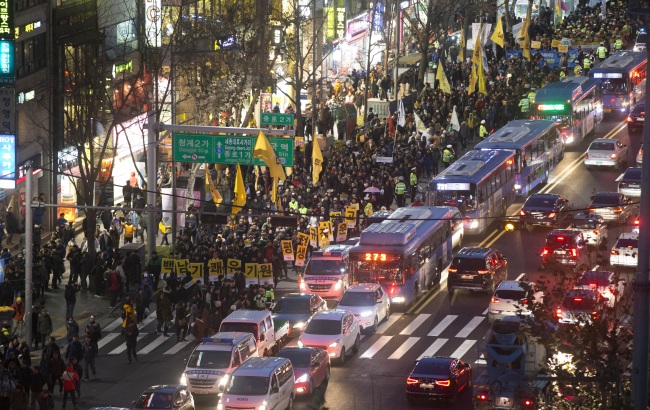It was a harsh end to the year 2015, as the nation roiled in escalating angst against the government’s agreement with Japan to settle the World War II wartime sexual slavery issue.
The year had already been riven with conflicts over education, ideology, labor and other social issues that are likely to continue in the coming year.
Social division is expected to only deteriorate as the nation enters major elections, starting with the April 13 general election, which is shaping up as a prelude to the 2017 presidential race. A major economic downturn alongside soaring government and household debt would further dim prospects of the country reconciling its ongoing conflicts.

Protests are expected to continue over the Dec. 28 Korea-Japan agreement on settling the comfort women issue “irreversibly.” Groups representing the victims have vowed to fight on with the opposition parties joining the bandwagon of lambasting the government for the rushed negotiation that did not reflect the demands of the victims.
The agreement amplified the surging dissatisfaction mainly among the younger and more progressive constituents against Cheong Wa Dae, which has continued to face criticisms of oppressing freedom of expression, retrogressing democratic processes and monopolizing decision-making procedures.
The main opposition party’s bungled struggle to scrape together the support of dissatisfied moderates is also expected to dent its fortunes. At best, it will bolster alternative political forces’ stature. At worst, it will swell the number of those apathetic about politics.
Education-related standoffs will become an issue from the get-go, as the government had been warning of the “child-care crisis” that will result in the failure of the Nuri program, which subsidizes kindergarten and day care centers. Local education offices have been refusing to allocate budgets for the program, expected to cost 2.1 trillion won ($1.8 billion) for 2016 alone, saying that the law states regional education budgets only cover educational facilities, under which day care centers do not fall.
But another giant confrontation is being heralded concerning the Park Geun-hye administration’s much-disputed flagship education policy of reinstating government-issued history textbooks for secondary education.
Professors from major universities including Seoul National University, Korea University, Yonsei University and Hanyang University have refused to participate as authors in protest, and the government has said they will keep the identity of participating authors under wraps to protect them from criticism.
The textbook war stems from the left-right standoff over views of Korea’s modern history. Evaluation of conservative political figures such as ex-President Park Chung-hee -- the incumbent leader’s father -- and Rhee Syng-man --- the country’s founding president -- along with descriptions about Japan’s 1910-1945 colonialization of Korea and depiction of communist North Korea has been one of the most hotly contested issues in Korea.
State textbooks were one of the main rallying points behind the three massive antigovernment rallies of November and December in 2015, but the other pillar of the protests was the contentious labor reform.
Park had bemoaned, denounced and even threatened the National Assembly -- particularly the opposition -- for failing to pass bills that would allow her labor reform bills, accusing them of being “a proxy for the privileged.”
The five-point law revision encompasses reduction of working hours, improvements in benefits for the unemployed, adopting the “wage peak” system, expanding sectors that employed temporary workers and extending the working period of temporary workers.
The Korean Confederation of Trade Unions, led by Han Sang-kyun who was arrested for leading illegal rallies, is among thousands of workers who, along with the opposition, say the reform will prolong the time of workers’ nonguaranteed contracts. They have also raised concerns that the new bill allowing companies to dismissed underperforming employees will allow “easy firing.”
The government maintains that the reforms will improve labor conditions, such as by providing more jobs for young people via the wage peak system. The Finance Ministry said on Dec. 23 that implementing the wage peak system at state-run organizations has created over 4,000 new jobs.
Park, who linked the high unemployment rate to the low birthrate, said that the older generation should “concede” to the younger generation.
But Park’s rhetoric unwittingly touched on another thorny issue: intergenerational conflict that had emerged amid the economic slump, differences in political views and a shift in values.
As Korean society has traditionally had its roots in Confucian values, respect for elders had been among the most important elements. The younger people are practically mandated to use different language and wear different attire when addressing elders.
But frustration over the economic slump, intensified by the sense of deprivation, has driven the younger generation away from the older generation.
According to Lee Shin-hye, a member of the Seoul city council, the Seoul Metropolitan Government allocated just 80.6 billion won for youth-related policies, while spending 1.2 trillion won on those aged 65 or older.
The derogatory term “noseulachi,” a combination of “no” for old and “byeseulachi” for government official, represents the hostility youngsters have built toward the elderly.
In a survey of 1,000 Koreans aged 13 or over, conducted jointly by the Presidential Committee for National Cohesion and local daily DongA Ilbo, 79.6 percent of respondents said Korea suffered from “severe” conflict between the older and younger generations. Over 60 percent of those in their 20s and 30s said they perceived elderly citizens in a negative way, citing stubbornness, obsession with the past and a supposed lack of respect for younger people.
By Yoon Min-sik
(minsikyoon@heraldcorp.com)












![[Today’s K-pop] BTS pop-up event to come to Seoul](http://res.heraldm.com/phpwas/restmb_idxmake.php?idx=644&simg=/content/image/2024/04/17/20240417050734_0.jpg&u=)




![[KH Explains] Hyundai's full hybrid edge to pay off amid slow transition to pure EVs](http://res.heraldm.com/phpwas/restmb_idxmake.php?idx=652&simg=/content/image/2024/04/18/20240418050645_0.jpg&u=20240419100350)

